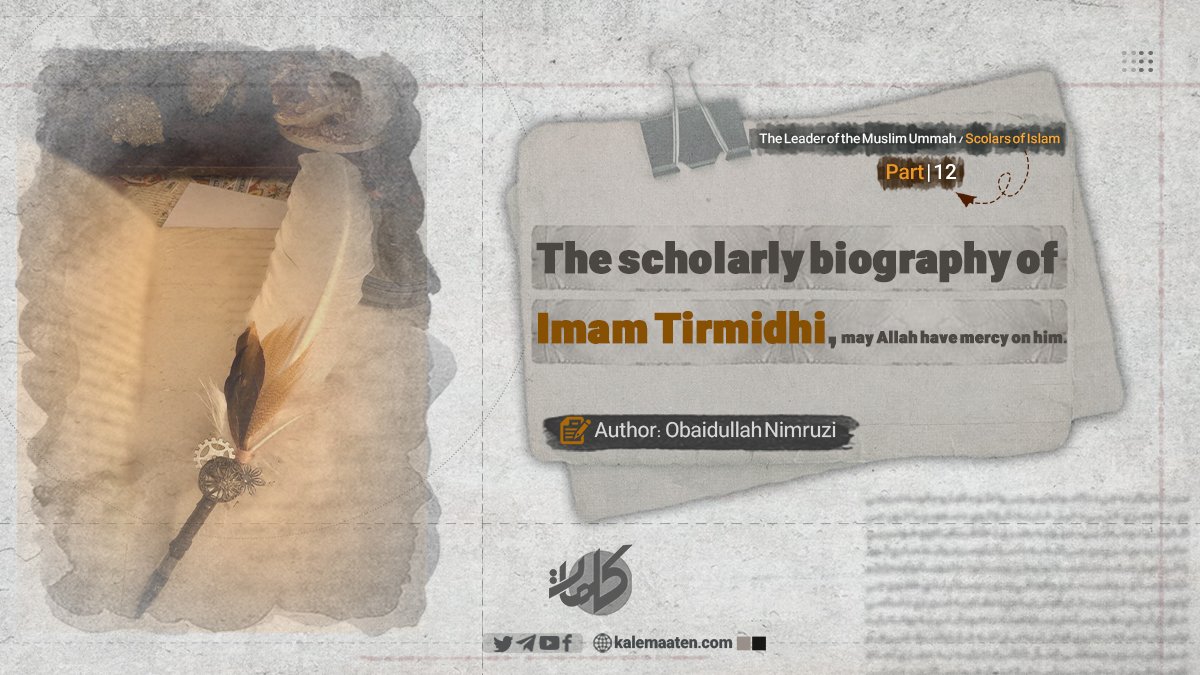
Author: Obaidullah Nimruzi
The Scholarly Biography of Imam Tirmidhi ;may Allah have mercy on him’ (Part 12)
Findings
Traditionally, Islamic scholars at the beginning of each science propose introductory topics known as “the eight main topics” or “the eight research topics.” These topics present a coherent framework for a better understanding of the science and include the following:
1. Definition of science
2. Subject of science
3. Purpose and goal of science
4. The way of naming science
5. The virtue of science
6. Types of works
7. History of the compilation of science
8. The position and rank of science among other sciences
In this introduction, in addition to the above topics, other important topics will also be examined.
The Literal and Idiomatic Meaning of Hadith
Allamah Jawhari, one of the great scholars of Arabic philology, writes in the book of Sahih about the literal definition of hadith: “Hadith: Al-Kalām qalīla wa kathirah wa jumāh aḥādīth.” Accordingly, in the literal sense, the word “hadith” refers to any kind of speech and discourse, whether small or large; however, the definition of the term hadith is subject to verbal disagreement among Islamic scholars, even though there is unity in its overarching meaning. Allama Tahir bin Salih Al-Jazairi points out in his book “Al-Nazar Fi Usul Al-Talaash” that the definition of hadith differs between Usulists and Muhaddithists.
Definition of Hadith Among Usulists
Usul fiqh scholars define “hadith” as follows: “Hadith is the sayings and actions of the Messenger of Allah (peace and blessings of Allah be upon him).” This definition also includes the narration of the Prophet (peace and blessings of Allah be upon him), because narration is considered a type of verbal action. The important point is that the involuntary attributes and states of the Prophet (peace and blessings of Allah be upon him), such as physical or inherent characteristics, are not included in this definition, as these attributes lie outside the scope of his authority. Some scholars, such as Usulians, believe that these attributes cannot be used as a basis for deducing religious rulings; therefore, they have excluded them from the definition of hadith.
Definition of Hadith by the Scholars of Hadith
On the other hand, the scholars of hadith use the term “hadith” in a broader sense. In the terminology of the scholars of hadith, hadith includes the following: the sayings of the Prophet (peace be upon him); the actions of the Prophet (peace be upon him); the statements of the Prophet (peace be upon him); and the attributes of the Prophet (peace be upon him), including both optional and non-optional attributes.
Hafiz Sakhawi writes in his book Fath al-Mughaith: “Hadith is a language against the old and, in terms of terminology, refers to nothing that has been added by the Prophet (peace be upon him) by word, action, statement, or attribute, even movements and postures in waking and dreaming.” Accordingly, the movements and silences of the Prophet (peace be upon him) are considered part of the hadith, whether in wakefulness or sleep.
The Reason for Naming the Hadith
There are various opinions regarding why the words of the Messenger of Allah (peace be upon him) are called “hadith”:
1. Hafiz Ibn Hajar Asqalani writes in his book Fath al-Bari that since the Holy Quran is “ancient speech,” and on the other hand, the words of the Prophet (peace be upon him) are considered “hadith” (i.e., new and novel), they are called “hadith.”
2. Hafiz Sakhawi also refers to this matter in Fath al-Mughith, but considers this explanation unlikely and does not provide any other reason for the name.
3. Allama Shabir Ahmad Usmani expresses a deeper opinion in the introduction to Fath al-Mulham, believing that the word “Hadith” is derived from the verse: “And as for the favor of your Lord, narrate.” He explains that in this verse, Allah commands the Prophet Muhammad (peace be upon him) to recount the blessings of Allah, which include teaching the rules and laws. The Prophet Muhammad (peace be upon him) was tasked with conveying to people what Allah had taught him through his words and actions. For this reason, the sayings and actions of the Prophet (peace be upon him) were called “Hadith.”
Synonyms of Hadith: Narration, News, Asar, and Sunnah
In the terminology of Hadith scholars, the words “narration,” “news,” “Asar,” and “sunnah” are sometimes used as synonyms for hadith. However, some scholars recognize differences between them:
1. Ibn Hajar Asqalani states that “hadith” refers to the sayings, actions, and circumstances of the Prophet Muhammad (peace be upon him).
2. Some scholars use “Khabar” in a more general sense and distinguish between it and hadith: Hadith includes the sayings and actions of the Prophet (peace be upon him), while news comprises the sayings and actions of the Prophet (peace be upon him) and others.
3. The jurists of Khorasan use the word “hadith” for narrations attributed to the Prophet (peace be upon him), while “Asar” refers to the words of the Sahaba and Tabi,een. Imam Ghazali accepted this distinction, but Imam Nawawi wrote in his commentary on Sahih Muslim that according to the majority of scholars, there is no difference between “hadith” and “Asar.”
Some scholars believe that “sunnah” includes only the actions of the Messenger of Allah (peace and blessings of Allah be upon him) and his Sahaba, excluding verbal hadiths. However, common usage shows that there is no meaningful difference between the terms “hadith,” “news,” “Asar,” and “sunnah.” Imam Tahawi, in his book Sharh Ma’ani Asar, considers the reason for naming Asar to be related to the narrations attributed to the companions and the followers.
Accordingly, hadith, in the terminological sense as understood by hadith scholars, is a comprehensive concept that includes the sayings, actions, narrations, and attributes of the Messenger of Allah (peace and blessings of Allah be upon him). Although synonymous terms such as “news,” “Asar,” and “sunnah” are also used in texts, there are minor differences of opinion regarding their specific implications.
Continues…


